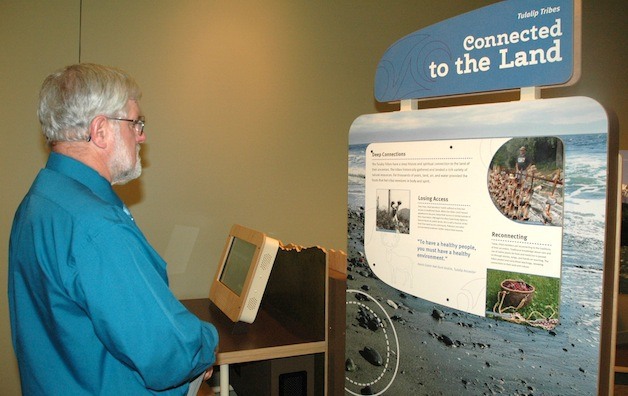TULALIP — The Tulalip Tribes have teamed up with other Native American nations to illustrate how their ancient cultural practices remain as relevant as ever in helping them restore their ecosystems.
The Hibulb Cultural Center and Natural History Preserve’s “Roots of Wisdom” exhibit opened May 16.
The Tulalip Tribes tout their organic gardens as evidence of how traditional foods can serve as medicine.
Tessa Campbell, assistant curator at Hibulb, and Mytyl Hernandez — who manages the center’s marketing, membership and public relations — thanked the Tulalip Tribes’ Lushootseed Department for contributing to the exhibit. That department has passed on its knowledge by telling traditional stories to third-graders at the center over the past month.
“You’ve kept the cultural fires burning,” said Campbell, who credited the Oregon Museum of Science and Industry (OMSI) with coordinating four regional tribal groups. “Each section shows how those tribes have used their own knowledge, in conjunction with modern science, to address the environmental issues impacting them. It’s geared toward native children, so it’s all very hands-on and interactive.”
Inez Bill, rediscovery coordinator for the center, recalled how the exhibit was a dream of her husband, Hank Gobin, who served as the Tulalip Tribes’ Cultural Resource Manager for 24 years. Gobin advised, initiated and designed what became Hibulb, which opened in 2011, two years before his death.
“This has been a long time coming,” said Bill, who recalled how OMSI approached the tribes back in 2009.
Campbell noted that many of the exhibits use quotes from Gobin and Bill.
Nancy Maryboy, manager of the exhibit and its research and development for OMSI, acknowledged that there was some apprehension from some of the tribes about the collaboration, but she deemed it a model of how a community and museum can work together for their mutual benefit.
“You can see the benefits to the younger generations, to have this knowledge passed on,” Maryboy said.
The exhibits showcase how the Waikalua Loko Fishpond Preservation Society in Hawaii has managed to restore and sustain its fish ponds in the face of changing resources, and how the Confederated Tribes of the Umatilla Reservation have protected the lamprey and provided healthy streams to foster the return of salmon.
The Eastern Band of Cherokee Indians’ displays explain how they’ve sought to reverse the depletion of river cane, the native bamboo they use for weaving baskets, and other species use as a habitat.
Hibulb is located at 6410 23rd Ave. NE in Tulalip.


